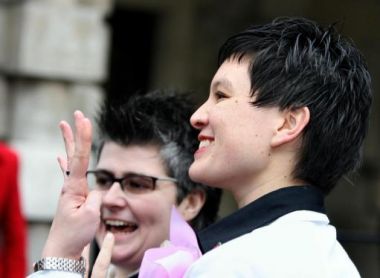Civil partnerships: ten years on

Nearly 140,000 people have entered into a civil partnership since the first one took place ten years ago today.
In addition, more than 18,000 people have celebrated a same-sex marriage since the law was changed to allow that also.
The Church of England remains mired in conflict over same-sex relationships and has secured a ban on gay marriages in all its buildings.
But throughout the rest of society, the enthusiastic take-up on the new laws show that gay marriage and civil partnerships have become just another normal part of inter-personal life
One couple celebrating the tenth anniversary of their civil partnership are Percy and Roger, who met on a blind date in 1966 when homosexuality was still illegal and are still together. They told the BBC they used to go to "sub rosa" nightclubs and give a false name and hope the premises were not raided.
If they had been "caught" they would have faced arrest, prosecution and jail.
"We were young and it was exciting in a way and almost an adventure," said Roger, now 88, and a former history professor. "But looking back at it from now one realises that potentially it could be awful. The subject of homosexuality was really taboo it was so awful that you couldn't discuss it with anybody."
They have recently converted their partnership to marriage.
Ben Summerskill, former chief executive of the gay rights lobby group Stonewall, said it had been pretty tough battle.
"Great swathes of the House of Commons and House of Lords were doggedly opposed to civil partnerships. The Church of England was doggedly opposed to civil partnerships... The world for young LGBT people has changed transformatively in a generation."
The Independent also spoke to those who had entered civil partnerships.
Siân Lambert, who is married to Emily Cobb, a civil servant, and lives with her in Greater Manchester, said they met at a ski resort in Colorado. "We'd been together a year-and-a-half when we got a civil partnership... we were in love and it bought our relationship a chance of survival. Ten years on and it's going pretty well – we converted our civil partnership into marriage last month. This gives us legal rights around the world and the option to move back to the US one day."
She added: "I do think that civil partnerships played a really important role in that a lot of people are more 'out' at work and in their personal life. I know of a lot of people who, when they decided to get civil partnerships, it was the first time they've come out to colleagues, friends or even family."
Rev Richard Kirker, 64, who formerly headed the Lesbian and Gay Christian Movement, lives with his partner Steve Caldwell, 56, in Whitechapel, London. They met in 1988 and became civil partners in 2006. "The time for us to have got married probably would have been around 1990, not 2014."
He said the ceremony was prosaic and unglamorous just offered recognition and security. "When one of us dies, the other will be a slightly stronger position to maintain their dignity and rights to what we have jointly built up over many years."
He added: "I was sacked from working with the Church of England in 1978 because I wouldn't agree to renounce my membership to all gay organisations or agree to remain silent on the subject.
"It's insanity on the church's behalf not to be at the forefront of campaigning for equal rights for gay couples – it goes against its principles of all men being created equally. Instead it wants to discriminate against people and we're not allowed to be married in a church."











